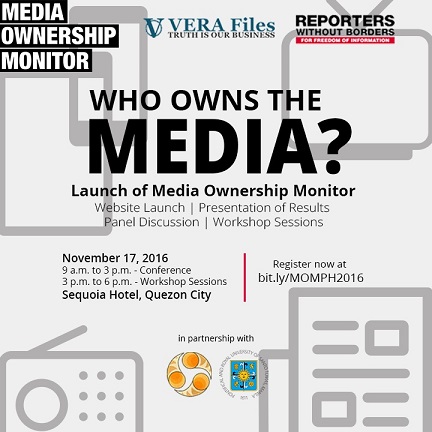Oftentimes, many people including government officials blame media for the many problems that they face in their governance.
Media-bashing was a standard fare in many of the speeches of former President Aquino. President Duterte has followed the same line.
Although the media-bashing reflects a warped appreciation of the role of media, it is also a recognition of the power of media- in its role as a vehicle of information to the public.
Information is the empowering tool. An informed public leads to an empowered citizenry essential for democracy to function well.
It is with this consciousness of the empowering role of the media that VERA Files (disclosure: I’m a trustee of VERA Files) gladly partnered with Reporters Without Borders in its Media Ownership Monitoring (MOM project in the Philippines when the opportunity was presented to us.
Who owns media factors a lot on the quality and credibility of the information we get. It is, therefore, important for people to also know who are behind the media, including the political and business affiliations of the owners, to enable them to better evaluate the information that are being dished out by media outlets.
We started the research last August covering television, radio, print and online meda. We will present the findings tomorrow, Thursday (Nov 17) in a press conference starting at 9 a.m. on at Sequioa Hotel in Mother Ignacia, Quezon City.
The findings will be posted in a website that will be launched also tomorrow (http://philippines.mom-rsf.org). The text will be in English and Filipino.
The study showed it’s a duopoly with ABS-CBN and GMA7, dominating the Philippine media industry getting over 80 percent of audience share. The other networks -TV5, IBC13, PTV4 – have to compete for the remaining 20 per cent or less who are not glued to ABS-CBN and GMA7.
The two dominant networks are a major influence in shaping public opinion and in the people’s decision-making. This is most important during elections.
The print market is more evenly distributed among players due to the diversity of tabloid and broadsheet titles. According to the Nielsen Consumer and Media View for the second quarter of 2016, tabloid newspapers are still more read compared to broadsheets.
The study also showed that media owners belong to the country’s rich which is not surprising because media is a capital-intensive business. A publisher once reminded everybody to have a reality check with a modern-day Golden Rule: “He who owns the gold, rules.”
In the course of our research, we realized that even as the media demand transparency from the government and other sectors of society, the industry is not as transparent as it should be. Which does not speak well of media since it takes the role of a government watchdog.
Following the launch is a panel discussion on “ Media Ownership Transparency and Regulation: What’s next?” Lawyer Romel Bagares will present a paper based on his legal assessment. Panelists are Rigoberto Tiglao, Manila Times columnist Manila Times and author of the book, Colossal Deception; Maria Regina E. Reyes, head of Integrated News and Current Affairs, ABS-CBN Corporation; John Nery, Editor in Chief, INQUIRER.net and Associate Editor, Opinion Columnist, Philippine Daily Inquirer; and Clarissa David of the Graduate Studies Department, College of Mass Communication, University of the Philippines.
We hope that a public discussion of these issues could lead to greater accountability of the media to the public as well as an enabling environment for a free and vibrant media.
The Media Ownership Monitor (MOM) Philippines is part of RSF’s global project to study the extent of the concentration of media ownership, a prerequisite for securing freedom of the press and defending the diversity of opinions.
The Philippines is the eighth country where RSF has MOM. Started last year in Colombia and Cambodia, this year RSF embarked on MOM in five more countries -Tunisia, Turkey, Mongolia, Peru, and Ukraine.
Reporters Without Borders Germany has existed for 21 years and is part of the international, Paris-based organization Reporters sans frontières, whose aim is to defend human rights, in particular freedom of the press and the right to inform and be informed anywhere in the world.
VERA Files is nonprofit media organization composed of veteran journalists committed to advance excellence in journalism by engaging in research-intensive, high-impact reports in multiple formats and providing training, particularly mentoring of journalists.

The study also showed that media owners belong to the country’s rich which is not surprising because media is a capital-intensive business. A publisher once reminded everybody to have a reality check with a modern-day Golden Rule: “He who owns the gold, rules.” Precisely. Kung ano gusto nila ihayag yun ang ihahayag. Kung ano ang ayaw nila ihayag, di nila ihahayag. Media pa naman ang pinaka medaling tulay sa pagitan ng mga tao at mga pangyayari sa paligid niya. At ang ano mang pahayag gamit ang media tsismis man o hindi, madalas at madaling paniwalaan ng mga tao.
Ang mas magandang title nito “Who holds the neck of the owner of media.”